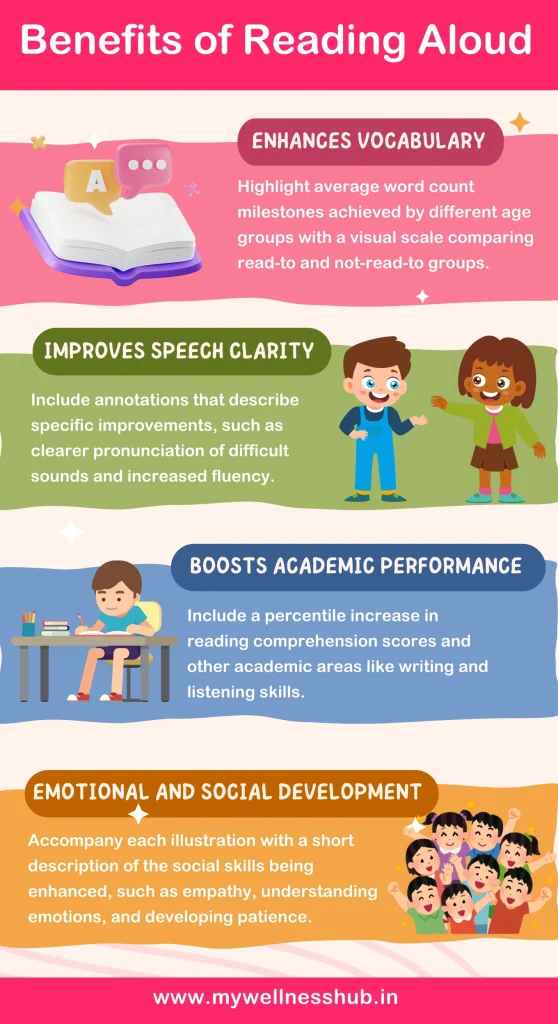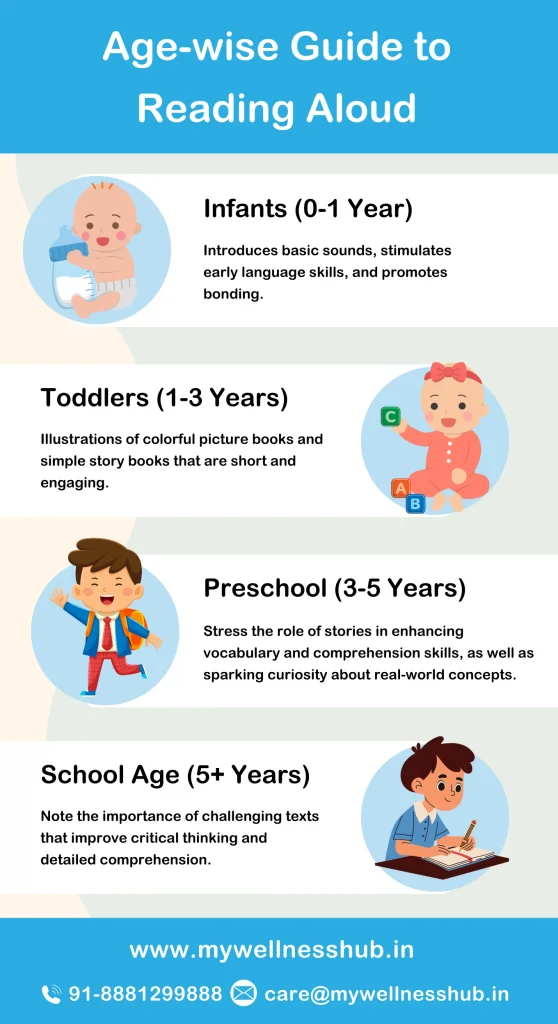Why Reading Aloud Boosts Kids’ Speech & Articulation
By Wellness Hub
Last Updated: December 16, 2024
Reading aloud is more than a quiet pastime; it’s a vital tool for articulation development in children. This simple practice helps enhance speech clarity and language skills, essential for effective communication. In this article, we’ll explore the significant benefits of reading aloud, backed by science and enriched with practical tips. Whether you’re a parent, educator, or caregiver, understanding and applying these insights can profoundly impact the communication abilities of the children in your care. Join us as we delve into why reading aloud should be a key component of your daily routine.
The Science Behind Reading Aloud and Articulation
Reading aloud is a simple yet powerful way to help children develop their speech. When kids listen to someone reading, they learn how words sound and how sentences are formed. This exposure is crucial for helping them articulate words clearly as they learn to speak.
Benefits of Reading Aloud

1. Enhanced Memory Retention
Hearing stories read aloud helps children remember information better. The process of listening engages the brain differently than reading silently, making it easier to recall details later.
2. Improved Speech Clarity
Regular reading sessions improve how clearly children speak. By hearing and imitating the sounds and rhythms of spoken words, they learn to pronounce words accurately, which is vital for good communication.
Benefits of Reading Aloud
| Benefit | Description | Impact on Children |
|---|---|---|
| Enhances Vocabulary | Exposes children to a variety of words in different contexts. | Increases word recognition and usage ability. |
| Improves Speech Clarity | Helps children learn how to pronounce words correctly. | Leads to clearer articulation and fluency. |
| Boosts Academic Success | Builds foundational skills for reading comprehension and writing. | Improves performance in school subjects. |
| Emotional Development | Strengthens bonds and supports emotional and social understanding. | Enhances empathy and social interactions. |
Historical Perspective on Reading Aloud
In the past, reading aloud was essential for sharing information when few people could read and write. Stories and important messages were passed down orally. This tradition helped people remember important information through repetition and rhythm. Today, reading aloud remains valuable for both preserving stories and improving language skills.
Educational Advantages of Reading Aloud

Reading aloud is a powerful educational tool, benefitting learners from preschool through higher education. Its impact on comprehension skills and academic success is profound and well-documented, making it a staple in effective educational strategies.
Enhancing Comprehension Skills
Reading aloud helps students of all ages understand and retain information more effectively. By hearing text read aloud, learners can better grasp complex ideas and abstract concepts. This auditory learning complements visual reading, making concepts clearer and more memorable. For young children, this practice is crucial as it lays the groundwork for independent reading and comprehension skills.
Role in Academic Success and Language Development
The benefits of reading aloud extend beyond basic literacy; they reach into all areas of academic success and language development. Regular reading sessions expose students to a richer vocabulary and a variety of sentence structures, enhancing their linguistic capabilities over time. In higher education, where critical thinking and complex analyses are required, reading aloud can help clarify dense texts and foster deeper understanding.
Practical Tips for Reading Aloud at Home
Reading aloud at home is one of the most effective ways to enhance your child’s articulation and language skills. Here are some practical tips to make the most out of your reading sessions, ensuring they are both enjoyable and educational.
Creating a Conducive Reading Environment
A good reading environment is quiet, comfortable, and free of distractions. Create a special reading nook in your home that invites your child to focus on the story. This could be a corner of their bedroom with a comfy chair or a dedicated space in the living room with cushions and good lighting. Make sure it’s a place where both you and your child can be comfortable for the duration of reading time. This setting not only makes reading more enjoyable but also helps in focusing attention, which is crucial for effective speech therapy reading exercises.
Choosing the Right Books
The choice of books can significantly influence the benefits of reading aloud for articulation. Select books that are age-appropriate and interesting to your child, as they are more likely to engage with the content. For younger children, choose books with rhymes and repeated phrases, which can help them learn sounds and rhythm. As children grow, introduce books with more complex language and diverse vocabulary to challenge their comprehension and speech skills.
Additional Tips:
- Read regularly, and make it a routine, preferably at the same time each day to establish consistency.
- Use expressive voices and facial expressions to make the story come alive and to demonstrate the emotive use of language.
- Pause occasionally to discuss the story, ask questions, and let your child predict what might happen next. This encourages active listening and critical thinking.
- Incorporate follow-up activities related to the book, such as drawing a scene or talking about the characters, to reinforce understanding and engagement.
Conclusion
Reading aloud is more than just sharing stories; it’s a key step in your child’s speech and language development. This simple activity enhances memory, improves clarity, and strengthens family bonds. Make reading aloud a part of your daily routine to see these benefits come to life. For more practical tips and resources, visit Wellness Hub. Together, let’s turn reading into a fun, enriching part of your family’s day. Start today, and watch your child’s language skills grow as you create lasting memories. Here’s to your reading adventures!
Frequently Asked Questions:
1. What are the benefits of reading aloud to children?
Reading aloud to children helps enhance their vocabulary, improves their understanding of language, aids in developing proper pronunciation, and increases their attention span. Regular reading sessions also boost their imagination and listening skills, which are crucial for overall cognitive development.
2. How often should I read aloud to my child?
Ideally, you should read aloud to your child daily. This consistency helps build a routine and provides regular language exposure, which is key to developing their articulation and comprehension abilities. Even just a few minutes each day can make a significant difference.
3. At what age should I start reading aloud to my child?
You can start reading aloud to your child as early as infancy. Babies benefit from hearing the rhythm and intonation of your voice, which lays the foundation for early language skills. As they grow, the complexity of the books can evolve to suit their developmental stages.
4. Can reading aloud help my child do better in school?
Yes, children who are read to regularly often have a stronger linguistic foundation, which translates to better academic performance. Reading aloud improves their vocabulary, comprehension, and critical thinking skills, all of which are essential for success in school.
5. What types of books are best for reading aloud to improve articulation?
For younger children, books with clear and simple language, repetitive phrases, and rhymes are ideal as they help with sound recognition and pronunciation. As children grow older, introduce books with more complex language and varied sentence structures to challenge and improve their articulation.
6. How can reading aloud improve my child’s speech clarity?
Reading aloud introduces children to the correct pronunciation of words and helps them learn how to form sentences. By imitating the reader, children practice articulating words clearly and accurately, which enhances their speech clarity over time.
7. Does reading aloud affect a child’s listening skills?
Absolutely, reading aloud encourages children to listen attentively, improving their ability to focus and understand spoken language. This practice is essential for developing good listening skills, which are crucial for academic learning and social interactions.
8. What can I do to make reading aloud more engaging for my child?
To make reading sessions more engaging, use animated voices for different characters and incorporate facial expressions and gestures to bring the story to life. Ask questions about the story to involve your child actively, and choose books with topics they are interested in to keep their attention.
9. How does reading aloud impact a child’s emotional development?
Reading aloud fosters emotional bonding between the parent and child, creating a secure and nurturing environment. It also helps children understand and express their own emotions better by relating to characters and situations in the stories.
10. Where can I find resources for effective reading aloud strategies?
For a wealth of resources on reading aloud, including book recommendations and reading techniques, visit Wellness Hub. Our site offers practical advice and tools to help you make the most of your reading sessions, enhancing both the educational and emotional benefits of reading aloud.
About the Author:
Rajini Darugupally
M.Sc., Speech-Language Pathologist (9+ years of experience)
Rajini is a passionate and dedicated Speech-Language Pathologist with over 9+ years of experience, specializing in both developmental speech and language disorders in children and rehabilitation in adults. Currently, at Wellness Hub, she thrives in a team environment that values innovation, compassion, and achieving results for their clients.
Book your Free Consultation Today
Parent/Caregiver Info:
Client’s Details:
* Error Message









